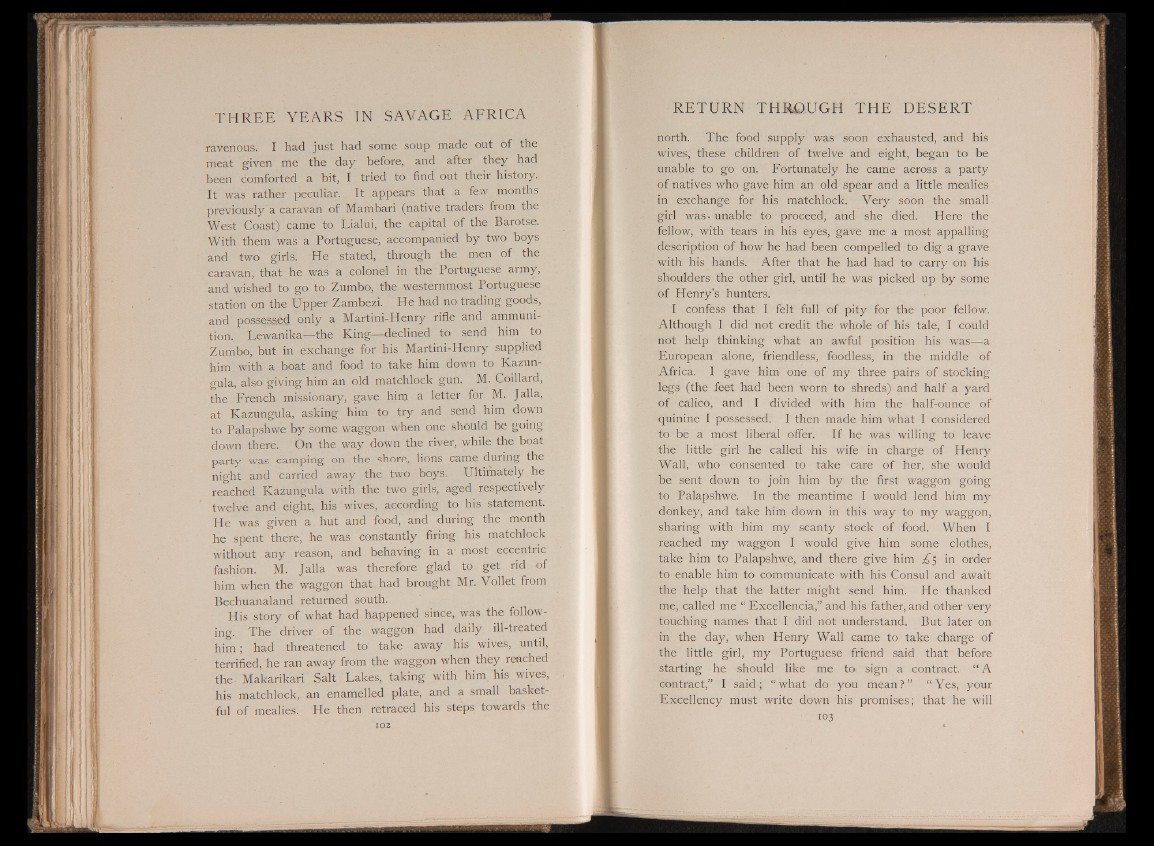
ravenous. I had just had some soup made out of the
meat given me the day before, and after they had
been comforted a bit, I tried to find out their history.
It was rather peculiar. It appears that a few months
previously a caravan of Mambari (native traders from the
West Coast) came to Lialui, the capital of the Barotse.
With them was a Portuguese, accompanied by two boys
and two girls. He stated, through the men of the
caravan, that he was- a colonel in the Portuguese army,
and wished to go to Zumbo, the westernmost Portuguese
station on the Upper Zambezi. He had no trading goods,
and possessed only a Martini-Henry rifle and ammunition.
Lewanika—the King—declined to send him to
Zumbo, but in exchange for his Martini-Henry supplied
him with a boat and food to take him down to Kazun-
gula, also giving him an old matchlock gun. M. Coillard,
the French missionary, gave him a letter for M. Jalla,
at Kazungula, asking him to try and send him down
to Palapshwe by some waggon when one should be going
down there. On the way down the river, while the boat
party was camping on the shore, lions came during the
night and carried away the two boys. Ultimately he
reached Kazungula with the two girls, aged respectively
twelve and eight, his wives, according to his statement.
He was given a hut and food, and during the month
he spent there, he was constantly firing his matchlock
without any reason, and behaving in a most- eccentric
fashion. M. Jalla was therefore glad to get rid of
him when the waggon that had brought Mr. Vollet from
Bechuanaland returned south.
His story of what had happened since, was the following.
The driver of the waggon had daily ill-treated
him; had threatened to take away his wives, until,
terrified, he ran away from the waggon when they reached
the Makarikari Salt Lakes, taking with him his wives,
his matchlock, an enamelled plate, and a small basketful
of mealies. He then retraced his steps towards the
north. The food supply was soon exhausted, and his
wives, these children of twelve and eight, began to be
unable to go on. Fortunately he came across a party
of natives who gave him an old spear and a little mealies
in exchange for his matchlock. Very soon the small
girl was- unable to proceed, and she died. Here the
fellow, with tears in his eyes, gave me a most appalling
description of how he had been compelled to dig a grave
with his hands. After that he had had to carry on his
shoulders the other girl, until he was picked up by some
of Henry’s hunters.
I confess that I felt full of pity for the poor fellow.
Although I did not credit the whole of his tale, I could
not help thinking what an awful position his was—a
European alone, friendless, foodless, in the middle of
Africa. I gave him one of my three pairs of stocking
legs (the feet had been worn to shreds) and half a yard
of calico, and I divided with him the half-ounce of
quinine I possessed. I then made him what I considered
to be a most liberal offer. If he was willing to leave
the little girl he called his wife in charge of Henry
Wall, who consented to take care of her, she would
be sent down to join him by the first waggon going
to Palapshwe. In the meantime I would lend him my
donkey, and take him down in this way to my waggon,
sharing with him my scanty stock of food. When I
reached my waggon I would give him some clothes,
take him to Palapshwe, and there give him A5 in order
to enable him to communicate with his Consul and await
the help that the latter might send him. He thanked
me, called me “ Excellencia,” and his father, arid other very
touching names that I did not understand. But later on
in the day, when Henry Wall came to take charge of
the little girl, my Portuguese friend said that before
starting he should like me to sign a contract. “ A
contract,” I said; “ what do you mean?” “ Yes, your
Excellency must write down his promises; that he will
103